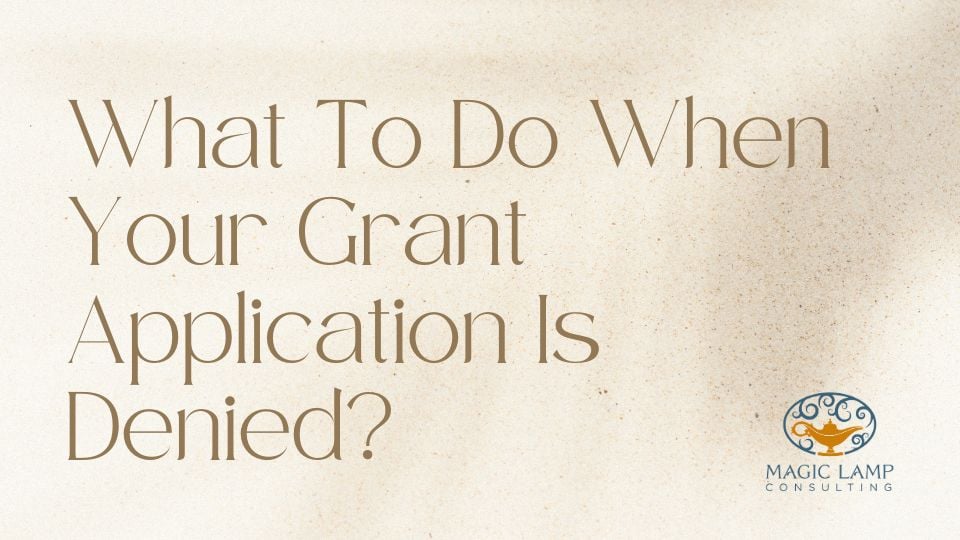If you’ve ever poured your heart into a grant application only to receive a rejection email weeks...
What to do when your grant application is denied?
Grant application denials can be disheartening, especially when the nonprofit organization is counting on that particular grant. However, do not let the initial disappointment stop you from continuing your quest for funding. At Magic Lamp Consulting, we never consider an application rejection a loss. Instead, we encourage our clients to use the denial as a foundation to build on for other grant opportunities. Remember, according to Instrumentl, only 1 in 10 grants get awarded.
Why Grants Are Denied
When applying for grants, it is important to remember there are more requests than available funds. Unfortunately, that means that many worthy requests will end up being denied. In addition, there are other reasons why grants may not be approved, including incomplete applications and not meeting the eligibility requirements. Therefore, it is important to understand why your application was rejected so that you can make adjustments and increase your chances of success when you apply in the future.
What to Do Next
Below are a few steps nonprofits should take to make sure that they understand the decision and use it as an opportunity for growth.
Learn from the experience, ask for feedback
Receiving a denial notice can be stressful; however, the experience can be a springboard for learning and improvement. Therefore, it is essential to take the time to thoroughly review the denial letter and identify the main points behind the decision.
Some of the best ways to learn from the experience of a denied grant application are to review the application to identify areas for improvement, request feedback, and research successful grant applications to see what elements might have been missed.
Some grantors are willing to provide feedback to applicants regarding why their application was denied; this could offer invaluable insight into where more information or changes are necessary for future success. Remember, don't throw out all of the hard work that went into preparing the initial application; use those components to streamline the process if similar types of grants are available in the future. Review this feedback carefully and consider how the organization can address any issues or shortcomings in future applications. With thoughtful reflection and strategic revisions, nonprofits can find themselves quite successful when applying for grants again!
Ideally, it is best practice to reach out to funders before applying, giving the funder a chance to familiarize themselves with the organization's work. Be sure to read the grant guidelines and frequently asked questions on their website. Funders often state they are not open to calls specific to an individual program or project application. Some funders also state they will be unable to provide feedback on denials.
A chance to establish a relationship with the funder
Connecting with the funder gives the nonprofit a chance to make a more personal connection with the funder. Some funders visit the nonprofits before the grant applications have been submitted. If this particular funder still has not been on site, now is the perfect time to extend an invitation to help them see firsthand the impactful work being done.
Continue seeking out other funding opportunities with feedback in mind
Don't give up on finding funding for the organization's programs and projects. We encourage you to explore other funding sources if a grant request is denied. Various grants are available, each with its own set of criteria and requirements. Take the time to research what other organizations that were awarded grant funding. Additionally, reach out directly to foundations or individual donors who may be more likely than larger institutions to support your mission—you never know who might be able to help!
Diversify Revenue Streams
Ensuring the nonprofit has a diversified revenue stream is important to remember that other funding opportunities and grants are available. Researching different funding options, such as individual donations, corporate sponsorships, fundraising events, or online fundraising platforms, can open up new avenues for potential support for your programs or organization. In addition, these alternative sources may provide additional resources to help with your goals and objectives, even if your grant application is denied.
Seek Advice From Professionals
Reaching out to experienced grant writing professionals can save nonprofits time and money. They may provide insight into why specific applications were accepted or rejected in the past, which can help inform how you approach writing future applications for grants or other funding sources. They may even provide helpful tips on writing better applications that increase the chances of getting accepted.
Receiving a denial letter can be disheartening, but it doesn't have to mean the end of your journey. Instead, it is an opportunity to learn, improve, and look for other options. With persistence and hard work, the organization can secure the funding to continue making a difference in the community.
Do you have specific questions about the grant writing process? We are here to help. Contact Magic Lamp Consulting for an On-Demand Consulting Session to focus on your organization's specific needs.
Why Grants Are Denied
When applying for grants, it is important to remember there are more requests than available funds. Unfortunately, that means that many worthy requests will end up being denied. In addition, there are other reasons why grants may not be approved, including incomplete applications and not meeting the eligibility requirements. Therefore, it is important to understand why your application was rejected so that you can make adjustments and increase your chances of success when you apply in the future.
What to Do Next
Below are a few steps nonprofits should take to make sure that they understand the decision and use it as an opportunity for growth.
Learn from the experience, ask for feedback
Receiving a denial notice can be stressful; however, the experience can be a springboard for learning and improvement. Therefore, it is essential to take the time to thoroughly review the denial letter and identify the main points behind the decision.
Some of the best ways to learn from the experience of a denied grant application are to review the application to identify areas for improvement, request feedback, and research successful grant applications to see what elements might have been missed.
Some grantors are willing to provide feedback to applicants regarding why their application was denied; this could offer invaluable insight into where more information or changes are necessary for future success. Remember, don't throw out all of the hard work that went into preparing the initial application; use those components to streamline the process if similar types of grants are available in the future. Review this feedback carefully and consider how the organization can address any issues or shortcomings in future applications. With thoughtful reflection and strategic revisions, nonprofits can find themselves quite successful when applying for grants again!
Ideally, it is best practice to reach out to funders before applying, giving the funder a chance to familiarize themselves with the organization's work. Be sure to read the grant guidelines and frequently asked questions on their website. Funders often state they are not open to calls specific to an individual program or project application. Some funders also state they will be unable to provide feedback on denials.
A chance to establish a relationship with the funder
Connecting with the funder gives the nonprofit a chance to make a more personal connection with the funder. Some funders visit the nonprofits before the grant applications have been submitted. If this particular funder still has not been on site, now is the perfect time to extend an invitation to help them see firsthand the impactful work being done.
Continue seeking out other funding opportunities with feedback in mind
Don't give up on finding funding for the organization's programs and projects. We encourage you to explore other funding sources if a grant request is denied. Various grants are available, each with its own set of criteria and requirements. Take the time to research what other organizations that were awarded grant funding. Additionally, reach out directly to foundations or individual donors who may be more likely than larger institutions to support your mission—you never know who might be able to help!
Diversify Revenue Streams
Ensuring the nonprofit has a diversified revenue stream is important to remember that other funding opportunities and grants are available. Researching different funding options, such as individual donations, corporate sponsorships, fundraising events, or online fundraising platforms, can open up new avenues for potential support for your programs or organization. In addition, these alternative sources may provide additional resources to help with your goals and objectives, even if your grant application is denied.
Seek Advice From Professionals
Reaching out to experienced grant writing professionals can save nonprofits time and money. They may provide insight into why specific applications were accepted or rejected in the past, which can help inform how you approach writing future applications for grants or other funding sources. They may even provide helpful tips on writing better applications that increase the chances of getting accepted.
Receiving a denial letter can be disheartening, but it doesn't have to mean the end of your journey. Instead, it is an opportunity to learn, improve, and look for other options. With persistence and hard work, the organization can secure the funding to continue making a difference in the community.
Do you have specific questions about the grant writing process? We are here to help. Contact Magic Lamp Consulting for an On-Demand Consulting Session to focus on your organization's specific needs.



.png?height=200&name=Why%20Great%20Programs%20Still%20Get%20Denied%20Grants%20(And%20How%20To%20Strengthen%20Your%20Proposals).png)

